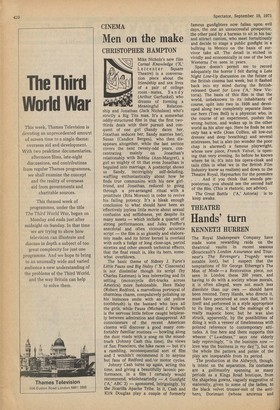CINEMA
Men on the make
CHRISTOPHER HAMPTON
Mike Nichols's new film Carnal Knowledge ('X,' Leicester Square Theatre) is a conversation piece about the friendship and sex lives of a pair of college room mates, Sandy (Arthur Garfunkel) who dreams of forming a Meaningful Relationship and Jonathan (Jack Nicholson) who's strictly a Big Tits man. It's a somewhat oddly-structured film in that the first twothirds deals with their pursuit and conquest of one girl (Sandy dates her, Jonathan seduces her, Sandy marries her), Susan (Candice Bergen), who then disappears altogether, while the last section covers the next twenty-odd years, concentrating mainly on Jonathan's relationship with Bobbie (Ann-Margret), a girl so mighty of tit that even Jonathan is beguiled into marriage. A postscript shows us Sandy, incorrigibly self-deluding, waffling enthusiastically about how he finds true communion with his new girlfriend, and Jonathan, reduced to going through a pre-arranged ritual with a prostitute (Rita Moreno) in order to revive his failing potency. It's a bleak enough conclusion to what should have been an 'effectively joyless little movie about sexual confusion and selfishness, yet despite its many assets — which include a quartet of strong performances, and Jules Feiffer's anecdotal and often viciously accurate script — the film is so glossily and elaborately made, and its bitter kernel is overlaid with such a fudge of long close-ups, period niceties and other smooth technical effects, that the final result is, like its hero, somewhat overblown.
The basic theme of Sidney J. Furie's Little Fauss and Big Halsy (' X,' Cinecenta) is not dissimilar though its script (by Charles Eastman) is less interesting and its setting (motorcycle dirt-tracks across America) more fashionable. Here Halsy (Robert Redford, a marvellous portrayal of charmless charm, compulsively polishing up his insincere smile with an old yellow toothbrush) is the bastard who lays all the girls, while Fauss (Michael J. Pollard) is the nervous little fellow caught helplessly between admiration and disapproval. All connoisseurs of the recent American cinema will discover a good many comfortably familiar routines — bowling along the dust roads with a song on the soundtrack (Johnny Cash this time), the views of San Francisco, the bike races — but it's a rambling, inconsequential sort of film and I wouldn't recommend it to anyone but fans of Redford and/or motor cycles.
Johnny Cash turns up again, acting this time, and giving a beautifully laconic performance, in a film I certainly would recommend, wholeheartedly — A Gunfight ('A,' ABC 2) — sponsored, intriguingly, by the Jicarilla Apache Tribe. In it, Cash and Kirk Douglas play a couple of formerly famous gunfighters now fallen upon evil days, the one an unsuccessful prospector, the other paid by a barman to sit in his bar and attract custom, who meet fortuitiously and decide to stage a public gunfight in a bullring in Mexico on the basis of survivor take all. The detail is etched in vividly and economically in one of the best Westerns I've seen in years.
Space doesn't permit me to record adequately the horror I felt during a Late Night Line-Up discussion on the future of the British cinema last week, but it flashed back into my mind during the Britishreleased Quest for Love ('A,' New Victoria). The basis of this film is that the world, unbeknown to its inhabitants of course, split into two in 1938 and developed along two completely separate lines: our hero (Tom Bell) is a physicist who, in the course of an experiment, pushes the wrong button, and wakes up in the other world as his alter ego. Here he finds he not only has a wife (Joan Collins, all low-cut dresses and deep breathing) and several mistresses, but is also (no wonder the poor chap is alarmed) a famous playwright, whose new piece, French Velvet, is opening that very evening. So before he knows where he is, it's into his opera-cloak and tails (this is what we in the British Film Industry know as realism) and down to the Theatre Royal, Haymarket for the premiere . . . And if you think that sounds preposterous, you should see the second half of the film. (This is rhetoric, not advice).
The Great Battle ('A,' Astoria) is to keep awake.


































 Previous page
Previous page